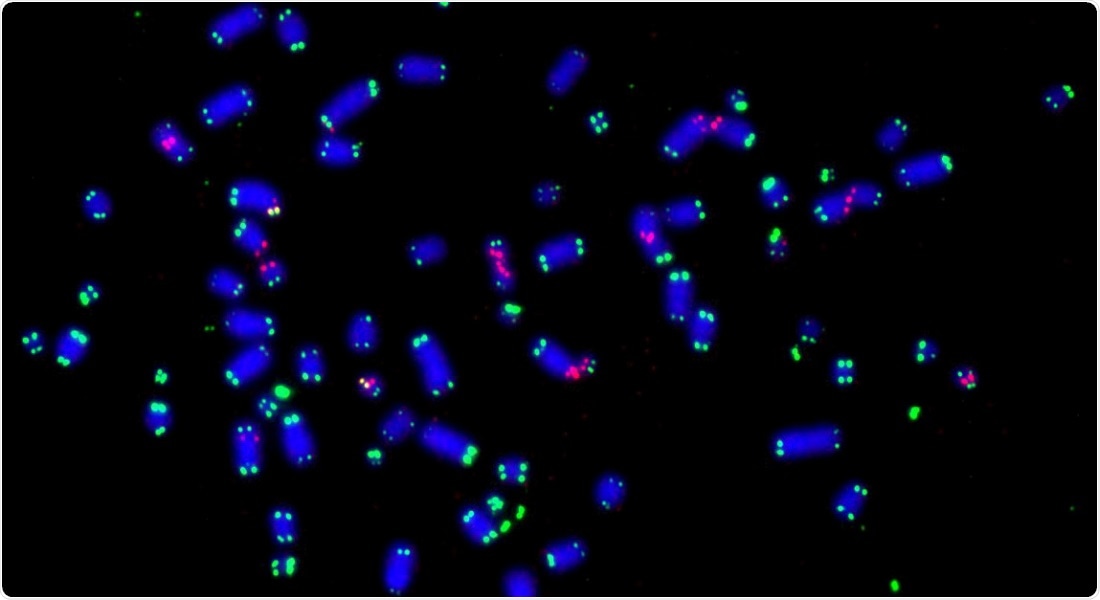
An image of MiDAS detected in a cancer cell derived from a human female patient with bone cancer. A normal cell has 46 chromosomes while this cell has 78 chromosomes. MiDAS is shown in red, and chromosomes are in blue with their ends being marked in green. Image Credit: University of Copenhagen.
Cell division is one of the most significant processes in the body, occurring throughout life. Normal cells have only a reduced number of divisions, whereas cancer cells undergo an uncontrollable cell division.
The cell division cycle comprises a number of phases. The two most significant are S-phase when the cell’s DNA is replicated or duplicated, and mitosis, when the replicated DNA is equally divided between the two daughter cells.
Hence, extensive research is being conducted to detect the proteins that have crucial roles to play in the cell division of human cells. In the latest study, scientists from the University of Copenhagen have revealed two major functions of a unique protein when cancer cells undergo the cell division cycle.
The study demonstrated that the protein, known as RTEL1, plays a vital role in both mitosis and S-phase. The outcomes of the study have been published in the scientific journal Nature Structural & Molecular Biology.
We discovered RTEL1 has two key functions. In the S-phase, RTEL1 can prevent damaging clashes between the processes of DNA replication and transcription (when RNA is made), which otherwise can cause DNA damage and chromosome instability. It does this by ‘ironing out’ certain unusual structures that can form between DNA and RNA called R-loops.”
Ying Liu, Associate Professor, Center for Chromosome Stability, Department of Cellular and Molecular Medicine, University of Copenhagen
Liu added, “The second feature is that RTEL1 promotes a process called MiDAS, which is very common in cancer cells and happens in mitosis.”
Tests with three forms of cancer
“Mitotic DNA synthesis,” or MiDAS for short, takes place during the initial stage of mitosis. In 2015, research led by Professor Ian Hickson discovered this process at the Center for Chromosome Stability.
Our earlier data showed that cancer cells utilize this unusual form of DNA replication far more often than normal cells, because cancer cells have a lot of ‘replication stress’ in S-phase due to the cell division cycle being perturbed by the over-activity of cancer-causing genes called oncogenes.”
Ian Hickson, Professor, University of Copenhagen
MiDAS assists the cells to complete the DNA replication process that was not finished during the S-phase.
Liu explained, “If MiDAS cannot take place, it leads to cell death or mutations in the surviving cells. In the case of cancer, this means that the cancer cell has the potential to become even more abnormal due to the new mutations.”
In the latest research, which is a follow-up of the earlier findings at the Center for Chromosome Stability, the scientists have mainly performed the tests on various cancer cell types, such as colon, bone, and cervical cancer.
Two roles in one cell division
To their amazement, the researchers observed the major role played by the RTEL1 protein in the cell division process.
We were investigating which proteins help cancer cells to use MiDAS. And then this protein, RTEL1, came up, which was a surprise. We did not expect it had such a big effect. We believe that this RTEL1 function is critical for any cancer cells that rely on MiDAS, which is more than 80 percent of the known cancer types based on our knowledge. Therefore, we can use this to design drugs to inhibit RTEL1 and hopefully selectively kill cancer cells.”
Ying Liu, Associate Professor, Center for Chromosome Stability, Department of Cellular and Molecular Medicine, University of Copenhagen
Going forward, the researchers have planned to study how the RTEL1 protein executes its two different roles and whether the roles are interlinked with each other. The team will also investigate how the RTEL1 protein induces MiDAS in mitosis.
Source:
Journal reference:
Wu, W., et al. (2020) RTEL1 suppresses G-quadruplex-associated R-loops at difficult-to-replicate loci in the human genome. Nature Structural & Molecular Biology. doi.org/10.1038/s41594-020-0408-6.